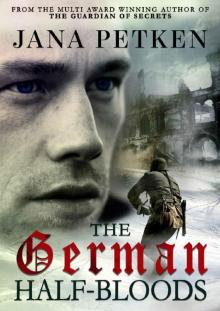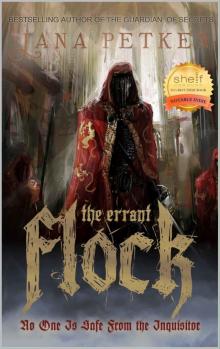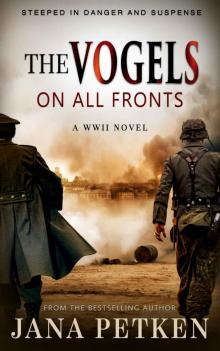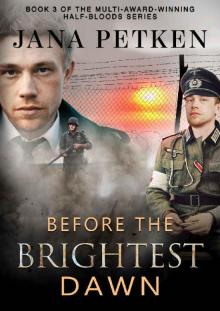- Home
- Jana Petken
The Guardian of Secrets and Her Deathly Pact Page 63
The Guardian of Secrets and Her Deathly Pact Read online
Page 63
María shook her head. She couldn’t bear to look at it, didn’t want to touch it, for that would make it real.
“No … I can’t … You read it.”
Ramón nodded his head and cleared his throat:
Gobierno Legitimo de España
Death Certifícate
This is to certify that Carlos Pons of La Glorieta, Valencia, and Combatant under the orders of the Spanish Republican Government, DIED in the Ebro-Gandesa sector on the 29 October of the year 1938 as a result of wounds sustained in action.
This certificate is issued in Barcelona, January 1939.
María stared at the ground, her only thought being why it had taken the government so long to certify Carlos’s death.
“October? Such a long time ago,” she said.
“Yes, yes, it is,” Ramón agreed. “But its delay is probably due to the intense fighting that has been going on.”
María nodded her head and then took a deep breath and exhaled slowly. The baby began to cry, as though he too felt the sadness that surrounded him. She rocked him in her arms and kissed the side of his head.
“I’m not surprised, Ramón. I think I’ve been waiting for this day to arrive but praying that it would never come at the same time. Can you understand? I feel as though I’ve already grieved for him; the great Carlos Pons died fighting for his great, useless cause!” She kissed her baby again and cast Ramón a venomous look. “Is this not a great cause?” She pointed to the baby. Is this not worth fighting for? Carlos never knew he was a father, and my son will never know him. I hate him!”
“Carlos loved you with all his heart. I know he wanted to prove that to you after the war. Please believe me – he did love you.”
María’s laugh was laced with sarcasm and bitterness. Ramón’s words were pretty, but they didn’t bring her any comfort, she thought.
“Ramón, it doesn’t matter now. He’s dead,” she said, shocked by her own coldness. “Nothing matters anymore. I look at his son and know that he will never have the comfort of knowing that his father loved him. He should know that at least.”
Ramón ran his fingers through his hair and lit a cigarette with hands that shook so much he had to use both to direct the match to his mouth.
“María, you don’t understand. How could you? Carlos did everything he could to protect you from information that could have endangered both you and little Carlos. He asked me to give you this letter in case he never came home. Will you read it?”
She took the letter from his hand and looked at Carlos’s bold writing. Carlos loved to write. He always believed that it had been one of his greatest achievements. Ramón took the baby from María’s arms and then stared at the ground, unable to look at her.
“Please destroy the letter when you have finished reading it. I’ll take my grandson to the house.”
My dearest María,
If you are reading this letter, it is because I’m dead. It is because I want you to have no more wasted moments waiting and wondering. I have never hidden the fact that I am a staunch believer in the republican cause, and I have never misled you regarding my loyalty towards that cause. You were born into a life of riches, security, and bourgeois traditions handed down to you from your ancestors, and in your quiet, secluded world you grew, mostly unaware of your fellow Spaniards and their sorry plight.
I remember the first time I saw you. You were sitting on a horse far too big for you and being led by your father through the valleys of La Glorieta. You were six years old, and I was a skinny, hungry, peasant boy standing by the side of the road, mesmerised by your beauty. I thought you were a princess. You spoke to me, remember? You asked me if I would like a drink of water from your flask. I fell in love with you on that day and have loved you ever since.
When you made your decision to stand by the republic at a time when you could have stood with your aristocratic peers, I had never felt so proud of another human being or so lucky to have loved you … and have you love me. Have I ever told you how much you mean to me? Or for how long I have yearned for you in these dark unending days and months? My love for you has been my strength, and it will be with me at the moment of my death. We will lose this war, María, and I fear that we, the peasants, will once again be oppressed, but tenfold. You, on the other hand, will be what you have always been, a lady with the most wonderful heart and purest of minds. It is important that you now know why I abandoned you so cruelly. First of all, you must know that I did not intend for you to be deserted in this way nor, at first, did I envisage my role in this war, my despicable part in atrocities that go far beyond the realms of human decency. It seems that our allies, the communists, have taken the purity of our cause and turned it into nothing more than a staging ground for their own warped ambition. They have spread their communist doctrine in our country without us really knowing what it was, and in our desire for their help to fight the fascists, they have taken good republicans and killed them.
They took me, in my enthusiasm for revenge against your class, and turned me into an agent of the SIMS and then the SEIP, organisations to which I eventually lost my soul. I make no excuses for my role in the torture of thousands. I also take full responsibility for my part in what I can only describe as the treacherous and unwarranted abuse of my own brothers in arms. I will die ashamed and with as much hatred for myself as I feel for General Franco and his henchmen. There will be no escape from my sins, not in this life or in the next. In the years to come, you will learn about me, what I was involved with, and why I could not allow you to be a part of it. You are, and always have been, good and honourable, and I could not allow you to be stained by the blood on my hands or put in danger by revenge organisations from the other side. I ask only that you remember me as the man I was, the man who loved you with all his heart until the day he died.
I want you to live your life to the fullest, my darling. I do not want your grief. I don’t deserve it. María, you have been the greatest thing in my life. Live for me now. Live a long and happy life.
Yours always,
Carlos
María’s hands shook, and she watched the letter slip from her fingers and float to the ground. Carlos’s confession had not brought her any comfort; instead, it had added to her pain. His conspiracy of secrets had left her with nothing except for a handful of beautiful, memorable nights and far too many sleepless nights alone, worrying about him. She would never have the memory of him holding his child in his arms or of the wedding that he’d promised her. This letter was all she would ever have, and she hated him as much as she loved him.
Carlos, like so many Spaniards, had gone forever, not because of a great and worthy cause like defending Spain against her enemies but because of a political and idealistic desire to defend a thought, a conviction. She had heard about the SIMS and the SEIP in Madrid, but they had been nothing more than whispered rumours that soldiers hardly dared to utter. These units had made no sense to her then, for how could such cruelty exist? Were republican or nationalist values worth the slaughter of so many men, women, and children? Would Spain look back and feel proud of a war that had killed hundreds and thousands of neighbours, friends, and family, or would it feel as she did now, betrayed by men with selfish political ambitions and lust for power? Was man’s need for revenge and hatred so strong that a country had to be destroyed?
She picked up the letter, folded it neatly, and put it back inside the envelope. She would not do as Ramón asked, she thought rebelliously. This was hers, hers forever.
Chapter 84
Spain, Present Day, 2010
Tears stung María’s eyes, and she blew unashamedly into her silk handkerchief. Lucia sat beside her grandmother as she had for the last week and felt her sadness as though it were her own. She had listened to her, sometimes shocked and sometimes happy or sad but always mesmerised with her story. Her grandmother’s memory was solid and clear, and she knew it was unstinting in truth and sincerity. She wished now that she’d known the old lad
y better and for longer. She had spent so much of her youth travelling, searching for hidden secrets and treasures, when all the time the most precious hidden secrets and treasures lay within her own grandmother’s mind. She had not even learned about the Spanish Civil War until she was an adult. She wondered now for the first time how her modern Spain, with a reasonably liked King Juan Carlos, could have been the bloody battlefield filled with such magnitude of hatred and revenge that her grandmother described.
Lucia studied her grandmother’s face. María was exhausted, although not through lack of sleep but from the ever-growing chore of living.
“Yaya, I don’t want you to upset yourself any more. Save your strength,” she told her in soft whispers.
“No, dear. I want to finish. I have to finish. I owe it to them.”
Lucia sat down in the chair at the side of the bed and watched her grandmother take on that faraway look that she now knew so well. She was taking her journey into the past, and nothing she could say would bring her back. She waited patiently for her to begin again …
Spain, 1939
Miguel lived in the trenches overlooking the distant rooftops of Madrid, and the damp hard-floored pits that left him masked in dirt had become his home. His existence in those days and nights had rolled into a tedious routine that left him craving battles and bloodshed. On 27 March, he awoke to the sound of men cheering. The long-awaited orders had arrived; they were to advance into the now almost defenceless city.
The nationalist force marched in virtually unopposed and after mopping up exercises with very few casualties. It was all over. Miguel’s first thought was to return to La Glorieta, but at the last minute, he decided to close a distasteful chapter in his life and returned to Valladolid instead.
Mónica faced him at the door of their house, surprised and indignant. It was as though, Miguel thought, he was nothing more than a memory to her, one that she wished to forget. They eyed each other up as adversaries, and Miguel suddenly smiled. He was ready to destroy her world now, and the destruction would be as fatal as a bullet.
“I’ve come to tell you only two things,” he said, now serious. “The first thing is that you will never be granted a divorce.”
Mónica’s shocked face and the hatred shining in her eyes only spurred Miguel on.
“Don’t get me wrong, Mónica. I don’t want you anymore. You disgust me,” he told her. “You always said you wanted good Catholic children but they’ll be bastard children if you get pregnant by Juan or any other man you sleep with. And no doubt you’ll want to continue to go to Mass on Sundays, but with the whole world knowing you’re nothing but an unfaithful whore, I’m betting that you will not be very welcome there. The second thing, you can start packing. This house is mine, and I want you out. It will lie empty until I sell it.
“Your father knows everything: how you broke your vows to me and how you used another man to keep you warm at night while I was fighting for the cause. And I have to tell you, he’s not a happy man – neither is the priest that married us.” He smiled again.
Mónica stood open-mouthed, tears running down her face, disbelief and fear forcing her to hold on to the door with both hands.
“Please, Miguel, forgive me,” she whispered.
“No, I’ll never do that,” Miguel told her. “I’m leaving for Valencia to continue the fight, but I’ll show my face in Valladolid every now and again just so you don’t tell everyone that I’ve been killed. Do you understand what I’m saying?”
Mónica nodded her head; she was ruined. She had broken the Phalanx rules, Franco’s rules, and her father and the Church would never forgive her.
“I understand completely,” she answered meekly.
A truck overflowing with fleeing republicans drove up the muddy mountains just inland of the main Valencia highway. The men hadn’t slept for days, and they took turns driving through the rocky mountain pass and out of the way of the oncoming nationalists. There were many republicans in trucks and ramshackle vehicles fleeing in the same direction, for they’d been told that the nationalists were killing every enemy combatant in sight, and that their only escape would be through the labyrinth of mountain passes and gorges that stretched inland. The men in the truck passed round a carafe of wine and shared some bread and cheese. They followed a tight bend in the road and laughed with relief and heady wine, for their victory was far greater than winning a war and more satisfying than receiving a medal for their actions in it.
“We’re going to make it!” one of the soldiers shouted out the window. “The bastards will never follow us up here. We can hide out until our government begins a new offensive. We’re safe!”
The driver approaching from the opposite direction was also going home, home to his family. Miguel smiled; he had survived after all. He took the crumpled photograph out of his jacket pocket and put it on the dashboard by the steering wheel. He’d almost forgotten that he had it. It had been left hidden in a drawer in his house in Valladolid, and it was one of the only things he had taken from his marital home. He hadn’t seen the faces smiling back at him for almost three years. His mother and father sat on two wooden chairs, holding hands just as they always did, wherever they were. The twins also sat, one on either side of his parents, while he and Pedro stood behind the seated group with their arms around each other’s shoulders.
He took a sharp bend in the road, and the photograph fell on to the floor. He bent down to pick it up and swore. An oncoming truck flashed its lights at him. Miguel stared at the blinding flash, forgot about the steering wheel, and covered his eyes just as the two vehicles collided. The explosion that followed was swift and lethal, giving none of the vehicles’ occupants a chance of escaping the ensuing fireball …
By 31 March 1939, all of Spain was in nationalist hands, and a final bulletin was issued from Franco’s headquarters. It read:
Today, with the Red Army captive and disarmed, our victorious troops have achieved their objective.
Pedro left Barcelona in the small hours of the morning, finally excused from duty, and headed home to La Glorieta. The end for him could have been all so different, he thought on the drive, because had the nationalists not captured him, he would now be faced with the possibility of banishment or death as a traitor to Franco’s new regime. Fate had dealt him an unbeatable hand, and his earlier days as a republican had gone virtually unnoticed. He felt no shame, no pride, only a longing for it to be over and a thankfulness that he had made it out alive.
He was once again Pedro Martinéz Merrill, rightfully named, a nationalist soldier and son of a major landowner and aristocrat who would have the right to enjoy the spoils of victory with his family. Family, he said repeatedly to himself, whilst trying unsuccessfully to banish Joseph Dobbs from his thoughts. He had seen his father die, but in reality Dobbs wasn’t family, not in his mind. He was an unimaginable evil worse than war and the savagery it brought. Joseph Dobbs had been his greatest challenge. He was and always would be the very worst of mankind, gleefully attempting to destroy everything in his path, and he would be remembered as such. His parents would never find out about his presence in the war or that his burial site was somewhere in the Spanish war-torn deserted plains. He would carry the burden of deceit and hide the truth from his parents forever.
At La Glorieta, a strange and peaceful quiet swept over the land. María walked towards Marta’s grave and, for the first time, noticed the absence of war. No more trucks and tanks came or went. Hurried flight and pain that only defeat can bring had silenced the voices of the men who drove them. María looked up and noted that even the sound of birds could be heard in the once-violent sky. It was as if they too had taken flight along with the dreams of so many and had now come back once more to look on peaceful land. Martinéz land had not seen the death and destruction of Spain’s battlefields, she thought thankfully, but the dead and dying had been taken there, and she believed that their brave souls would live on long after life returned to normal and the smell of orange b
lossom once again filled the air. She was relieved, glad that it was all over, but as she watched the remnants of the army scatter from her home in panic, she felt like a traitor. She had been on the same side of the now vanquished army, but whereas their defeat had left them with nothing, she still had her home, her inheritance, and a future secured by the fact that her father would, as a member of Spanish aristocracy, be welcomed back with open arms by the new regime.
She felt the breeze on her face, and her flagging spirits rose. Her family would come home now, and they would all be together again. Her joy would be tinged with sorrow for the brave, honest men and women she’d served with and who had died, not knowing that their struggle would ultimately end in defeat, but she would move forward in this new world that awaited her, and she would be happy! Carlos had died and so had her sister. The two people she had loved the most were gone, in very different circumstances but forever intertwined by the same terrible fate, yet she would be happy. She had a son, a reminder of the past, and a hope for the future.
Chapter 85
While half of Spain mourned and sought escape, Europe turned its eyes to Germany and to an inevitable war on many fronts. Celia, Ernesto, and Aunt Marie were making plans to return to Valencia. Ernesto’s state of health had continued to improve, although it still gave cause for concern. He was also plagued by questions and worries as he prepared to leave England. What role would he now have to play in a “new” Spain? He was well aware that in order to return to the home he loved, he’d have to publicly support Franco, and he hoped that by so doing, he could also protect his peasants from Spain’s new leader.

 Blood Moon
Blood Moon The Guardian of Secrets and Her Deathly Pact
The Guardian of Secrets and Her Deathly Pact Dark Shadows
Dark Shadows The German Half-Bloods (The Half-Bloods Trilogy Book 1)
The German Half-Bloods (The Half-Bloods Trilogy Book 1) Swearing Allegiance (The Carmody Saga Book 1)
Swearing Allegiance (The Carmody Saga Book 1) The Errant Flock
The Errant Flock The Vogels: On All Fronts (The Half-Bloods Trilogy Book 2)
The Vogels: On All Fronts (The Half-Bloods Trilogy Book 2) The Guardian of Secrets
The Guardian of Secrets Before The Brightest Dawn (The Half-Bloods Trilogy Book 3)
Before The Brightest Dawn (The Half-Bloods Trilogy Book 3) Blood Moon (The Mercy Carver Series Book 2)
Blood Moon (The Mercy Carver Series Book 2) Dark Shadows (The Mercy Carver Series Book 1)
Dark Shadows (The Mercy Carver Series Book 1)